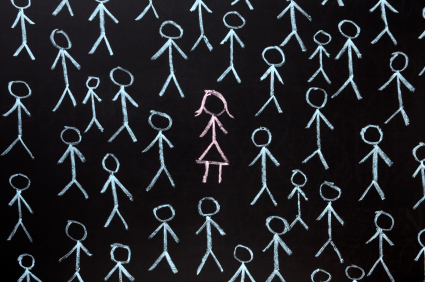 None of these statements probably strike you as particularly revelatory: white people CAN rap; black people CAN play country; women CAN rock!
None of these statements probably strike you as particularly revelatory: white people CAN rap; black people CAN play country; women CAN rock!
Let’s all pat ourselves on the back for a minute– we’ve recognized the foolishness of many of our former assumptions. (And by “our,” I suppose I mean “society’s,”– which I’ll let you define however you like.)
But the battle ain’t won yet!
OK now, party-time’s over. Just because fewer limitations are imposed on us these days based on race, sex, socio-economic status, or any other demographic category, it doesn’t mean racism, sexism, classism, or other –isms have completely subsided in the entertainment world; they’ve just taken on more subtle forms.
For this particular blog post, I’m curious about your experience with sexism in the music business; after all (as the cliche correctly goes), it’s a male-dominated industry.
OK. I’ll get things started…
… with a confession of my own. I’ve been guilty a few times of Cute-Girl Dismissal Syndrome. That is where you discredit the talents of a woman (normally without ever hearing a note of her music) simply based on the fact that she’s attractive according to the standards of… yes, society– and you bitterly assume this affords her some unfair advantage. Like the joke goes, “How do you get to perform at Hotel Cafe? Be a cute girl.”
But let’s turn this scenario around for a second. Aren’t most male music stars considered sexy (by at least some of the population)? No one ever says, “Oh, the Beatles– that’s that talentless band that made it because they’re cute.”
And when there are exceptions to the attractiveness rule, they’re generally on the male side of things. Both in film and music, the public seems more willing to “forgive” a guy his ugly face, gray hair, or beer belly if he exhibits enough charm or talent. Women aren’t afforded this same lenience.
If we acknowledge (sadly) that extra-musical concerns like attractiveness, fashion-sense, physical health, or even the brand-name of a musician’s instrument, have always played a part in the public’s perception of an artist, doesn’t it seem like a double-standard to hold a woman’s attractiveness against her when most of the successful men in the industry are also fit, fashionable, young, and handsome? We generally don’t hold a man’s good looks against him if he’s successful. Cute-Girl Dismissal Syndrome seemed relatively harmless at first (to me); but at the heart of things, it’s sexist.
And that’s just one of countless examples of a more subtle form of sexism that’s sometimes difficult to recognize because of its lower-volume, but higher-frequency (which, arguably, could be equally or more damaging than overt forms, since they’re harder to spot, harder to agree upon, and harder to rally the troops around when it comes time to make some change).
Anyway, that’s my confession. I’ve since learned to see (or hear) the error of my ways. Before making judgements, I’m trying to be more aware of some of my ingrained cultural assumptions.
How about you?
I realize that much of this post has centered on “attractiveness” (and we could spend hours discussing what that even means), but sexism can reveal itself in assumptions or prejudices about almost any aspect of life— from physical looks, to intelligence, to athletic ability, to mental or emotional expression, to communication, to art.
How have you dealt with sexism in the music world? How have you been guilty of it? What are some of the possible solutions, or ways of teaching people through it?
Also, I realize that there may be some applicable cross-over in the experiences of sexism AND racism or classism. If you feel like comments on racism or classism can add to a discussion on sexism, please feel free to join the conversation. (And I’ll do a post on those topics down the line.)
We’d love to hear your thoughts. Please feel free to leave your comments below.